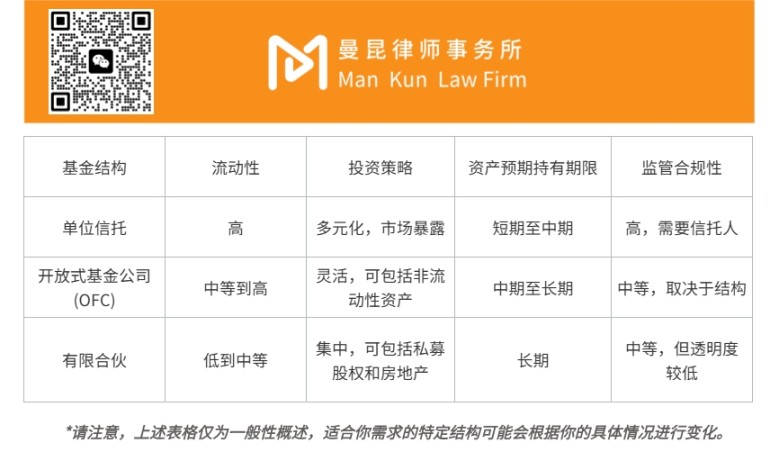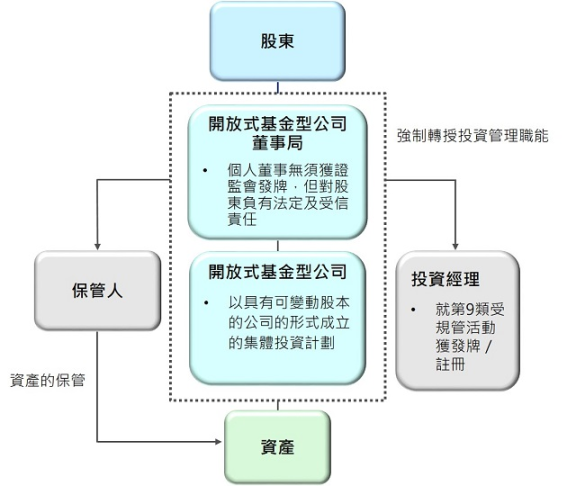Many Web3 entrepreneurs often feel confused when choosing to establish a crypto fund in Hong Kong, such as not being able to distinguish between certain fund concepts, worrying about the complex regulatory environment and cumbersome procedures. This article will help you understand.
Written by: Bai Zhen, Mankun Law Firm
As an international financial center, Hong Kong has a mature asset management system and has expanded it into the virtual asset sector. Especially starting in 2024, various crypto-friendly policies have attracted Web3 entrepreneurs to try to settle in. Bai Zhen, head of Mankun Law Firm's Hong Kong office, has found in past consultations that many Web3 entrepreneurs often have some confusion when choosing to establish a crypto fund in Hong Kong, such as not being able to distinguish between certain fund concepts and worrying about the complex regulatory environment and cumbersome procedures.
If you also have such confusion, don't worry, Mankun Lawyers will answer your questions.
3 Core Concepts
Before establishing a crypto fund, it is essential to clarify three core concepts, which are often the "culprits" causing confusion for fund founders.
1. Fund Manager
A Fund Manager is the person responsible for making investment decisions.
Unlike the mainland, Hong Kong allows private funds to be independently managed by fund management companies without the need to designate a fund manager. However, for public funds investing in virtual assets, such as Bitcoin ETFs, the Securities and Futures Commission (SFC) requires the appointment of at least one Key Investment Personnel (KIP), which refers to qualified staff with relevant experience responsible for investment strategy and compliance.
2. Fund Management Company
A Fund Management Company is the entity that operates the crypto fund and must obtain a Type 9 license (Asset Management) issued by the SFC. This involves the following requirements:
- Capital Requirements. Maintain a minimum capital level, the specific amount depends on the size of the company.
- Compliance Framework. Establish a comprehensive compliance framework, including Anti-Money Laundering (AML) and Counter-Terrorist Financing (CFT) measures.
- Risk Management. Implement effective risk management strategies to reduce the risks associated with virtual asset investments.
3. Fund Product Structure
As an investment vehicle, the fund product must ensure that its assets are completely separate from the personal assets of the fund management company and the fund manager. This separation of fund product structure is designed to reduce the risk of asset misappropriation and protect the interests of investors. The fund product structure typically includes the following key points:
- Asset Separation. Ensure that the fund's assets are independent of the assets of the fund manager and other related parties, safeguarding the property of investors.
- Legal Entity. Funds are usually registered as independent legal entities to enhance asset protection and management transparency.
- Investor Rights. The design of the fund product structure should clearly define the rights of investors, including terms for profit distribution and asset redemption.
After mastering these three key concepts, the next critical issue is "how to set up the fund structure."
Establishing a Crypto Fund
Here are the key steps and elements to consider when establishing a crypto fund:
1. Choose the Right Fund Type
When establishing a crypto fund in Hong Kong, the first step is to choose the appropriate fund type. There are two main categories:
- Private Fund. Targeted at high-net-worth individuals (individual professional investors), corporate professional investors, or institutional investors, with a higher investment threshold and relatively relaxed regulation in certain aspects.
- Public Fund. Aimed at public investors, with stricter regulations, such as Bitcoin ETFs. For crypto funds targeting the retail market, the following specific requirements must also be considered:
1. Investment Scope. Only invest in virtual assets recognized by the SFC to reduce risks.
2. Disclosure Requirements. Provide comprehensive information disclosure to investors, including the nature of the investment, risks, and fund structure.
3. Ongoing Reporting. Regularly report fund performance, compliance status, and changes in management strategy to the SFC.
2. Determine Fund Structure
Here are several common fund structures:
- Unit Trust. In this arrangement, investors purchase shares of the fund, which represent proportional ownership of the underlying assets of the fund. The assets of the fund are overseen by a trust company, which is responsible for managing and servicing these assets. The unit trust model is particularly adept at pooling resources from multiple investors, which is very beneficial for the capital-intensive operations typically required to establish and manage a crypto fund in Hong Kong.
- Open-Ended Fund Company (OFC). An OFC is an investment fund registered in Hong Kong in the form of a company. It differs from a unit trust because it is an independent legal entity with a board of directors. The directors have fiduciary duties and statutory obligations of prudence, skill, and diligence. Note: Do not be misled by the term "open-ended"; in the context of the SFC's OFC fund structure, despite the name suggesting "open-ended," an OFC can actually be closed-ended as long as the offering documents specify redemption restrictions and the articles of association envision the OFC as a closed-end fund.
- Limited Partnership. Partners include general partners and limited partners, with clear distribution of responsibilities and rights. The limited partnership structure is commonly used for private equity projects involving illiquid assets.

Here is an example of the Hong Kong OFC structure. The SPC/SP structure in the Cayman Islands includes a master fund (SPC = Segregated Portfolio Company) and multiple sub-funds (SP = Segregated Portfolio). Hong Kong also has a similar OFC open-ended fund company framework, which can reduce operational costs as there is no need to establish a new company for each sub-fund.

* Image source: SFC website
In the context of crypto funds, structures like SPC or OFC have advantages because they allow fund managers to implement various strategies across different portfolios, depending on the virtual assets in each portfolio. This is a win-win for both managers and investors, as investors can choose which portfolio they want to invest in without worrying about their assets flowing into other portfolios, while managers do not need to establish separate independent portfolios, making it relatively convenient.
In addition to establishing a crypto fund, another key component to consider is asset custody to ensure the independence, security, and transparency of the fund's assets.
Fund Asset Custody
The quality of custody services directly affects investor confidence and the stable operation of the fund, so special care is needed when choosing. Hong Kong fund management companies typically adopt the following custody arrangements for different types of assets:
1. Segregated Accounts
A Segregated Account means that each client's assets are held in separate accounts. This arrangement facilitates accurate calculation of each client's net asset value (NAV) and significantly reduces the risk of asset misappropriation. By managing segregated accounts, the traceability and transparency of assets are enhanced, meeting the stringent requirements of Hong Kong regulatory authorities for fund asset management.
2. Commingled Funds
A Commingled Account refers to a fund product where the investment manager collects funds from different investors and merges them into a single vehicle. This method simplifies management processes and reduces operational costs through economies of scale. However, it also requires more complex administrative procedures and higher compliance requirements. To protect the interests of each investor, Hong Kong fund management companies have established strict investment allocation and redemption mechanisms and conduct regular audits to ensure the safety and fairness of the fund.
Additional custody measures and considerations for Hong Kong crypto fund management include:
- Encryption Technology. Custody services typically employ advanced encryption technology to ensure the security of virtual assets during storage and transactions.
- Cold Storage Solutions. To prevent hacking and asset theft, cold storage (offline storage) should be used.
- Compliance and Regulation. Custody services in Hong Kong must comply with SFC regulatory requirements, including but not limited to anti-money laundering and counter-terrorist financing requirements.
- Regular Reporting. Custodians need to provide regular asset reports to fund management companies and investors to ensure timely and transparent information.
- Risk Management. Custody service providers must establish comprehensive risk management systems to address market fluctuations and potential risk events.
Through these measures, Hong Kong's crypto fund management companies can provide investors with a safe and reliable investment environment.
Next, when you officially operate your crypto fund business, you can also pay attention to Hong Kong's Unified Fund Exemption Scheme.
Can Crypto Funds Obtain Profits Tax Exemption in Hong Kong?
Hong Kong's Unified Fund Exemption Scheme allows funds to be exempt from Hong Kong profits tax under specific conditions, regardless of the fund's place of registration, as long as the key conditions are met, including:
I. It must constitute a "fund." You need to assess whether the structure you adopt meets the definition of a "collective investment scheme" under the Securities and Futures Ordinance.
II. All transactions of the fund must be conducted through an entity holding a Type 9 license from the Hong Kong SFC.
III. The fund's investment portfolio must include "securities" as defined by the Securities and Futures Ordinance.
It is important to note that conditions (I) and (II) are relatively clear, but condition (III) presents uncertainty for cryptocurrency funds. Therefore, caution must be exercised when determining whether your virtual asset portfolio falls under the definition of "securities" as per the Securities and Futures Ordinance!
Mankun Lawyers Summary
Establishing a crypto fund in Hong Kong is full of opportunities but also requires careful handling of the complex regulatory environment. Understanding the roles of fund managers, fund management companies, and fund products is crucial. Fund management companies can successfully operate crypto funds by complying with SFC regulations, choosing appropriate custodians, and maintaining transparent communication with investors. As the virtual asset sector continues to evolve, understanding regulatory changes and market trends is essential for long-term success.
免责声明:本文章仅代表作者个人观点,不代表本平台的立场和观点。本文章仅供信息分享,不构成对任何人的任何投资建议。用户与作者之间的任何争议,与本平台无关。如网页中刊载的文章或图片涉及侵权,请提供相关的权利证明和身份证明发送邮件到support@aicoin.com,本平台相关工作人员将会进行核查。



